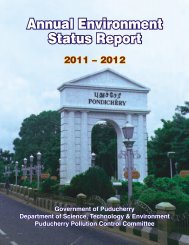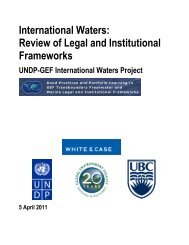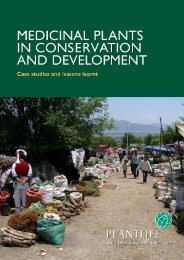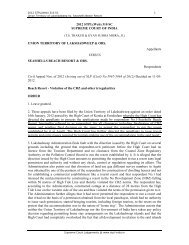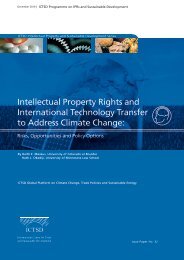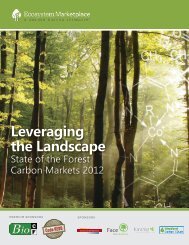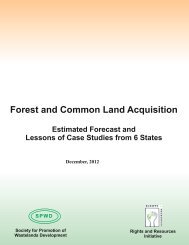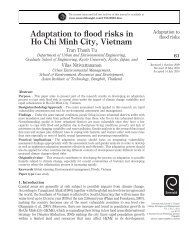DEFORESTATION AROUND THE WORLD - India Environment Portal
DEFORESTATION AROUND THE WORLD - India Environment Portal
DEFORESTATION AROUND THE WORLD - India Environment Portal
Create successful ePaper yourself
Turn your PDF publications into a flip-book with our unique Google optimized e-Paper software.
Deforestation Dynamics:<br />
A Review and Evaluation of Theoretical Approaches and Evidence from Greece<br />
economies by the depletion of forest resources are spread to society whereas the economic<br />
profits from wood exploitation and agricultural production in formerly wooded land are<br />
capitalized on by the intruders.<br />
Approaches for unsustainable forest resource exploitation are not scarce. Several researchers<br />
(Roberts and Greimes 2002; Shandra, London et al. 2003), drawing from the “theory of<br />
dependence” by Baran, Frank and Amin as well as from “world systems theory” by Wallerstein,<br />
claim that the developed regions have establish a particular system of economic exchange<br />
that imposes certain land use patterns to the less developed regions. This particular<br />
economic exchange process between the developed and the less developed peripheries takes<br />
place on unequal terms resulting in the unsustainable use of natural resources in the less<br />
developed areas. Power, wealth and prosperity are, therefore, related to the depletion of<br />
forest resources in the developing regions and to the sustainable use and possible expansion<br />
in prosperous regions.<br />
Both the importance and the adaptive nature of strategies employed by agents in order to<br />
maintain their prosperity level were firmly established in the context of “multi-phasic<br />
response theory” proposed by Davis in 1963. It is now believed that applied more broadly,<br />
multi-phasic response theory can help to understand how agents decisions impact land use<br />
changes (Lambin, Geist et al. 2006).<br />
A similar body of approaches attempts to apply concepts from “game theory” in order to<br />
capture agents’ behaviour in forest land use change process. (Fredj, Martνn-Herrαn et al.<br />
2004). According to some of these perspectives, the major decisive force of the way forest<br />
resources are utilized is state policies. State policies are far from static paying particular<br />
importance to economic growth during periods of economic difficulties where<br />
environmental concerns are ranked low in social agenda. Therefore, regardless of the level<br />
of economic development, the changing conditions of economy over a period of time could<br />
result in the adoption of a sustainable or a less sustainable behaviour towards forest<br />
resource. However, in some cases the unsustainable behaviour adopted by agents may not<br />
lay on the difficulties brought about by unfavourable economic conditions. It might be, in<br />
fact, an act of land speculation based on either high tolerance shown by the political system<br />
or insufficient administrative and environmental monitoring mechanisms. Yet, in the<br />
context of game theory it is proposed that it is possible to arrive to sufficient and sustainable<br />
solutions to the issue of deforestation through cooperation and coordination of the involved<br />
parties and individuals (Fredj, Martνn-Herrαn et al. 2004; Stern 2006).<br />
On the other hand, there is a quite different view concerning the current social behaviour<br />
and state intervention towards forest resources. It is widely believed that current<br />
afforestation policies are not merely an opportunistic reaction to the undisputed acute<br />
depletion of forest resources and its associated impacts. Instead, they also revile a much<br />
deeper transformation of social attitudes and ethics towards the environment. Mather et. al<br />
(2006) argue that at least in the case of developed countries, a great part of society is driven<br />
by the principles of post-productivism philosophy. Profit maximisation is not the only as well<br />
as the central axis of individual behaviour formation. Economic growth is possible to coexist<br />
with protection and restoration of the environment. Several aspects of this new philosophy<br />
of post-productivism can especially be traced in the countryside (Shucksmith 1993) in the<br />
form of certain environmentally sensitive policies that are voluntarily embraced by farmers.<br />
Amongst other, afforestation policies, organic farming measures and codes of good<br />
agricultural practice aim to establish alternative agricultural land management as well as<br />
127



